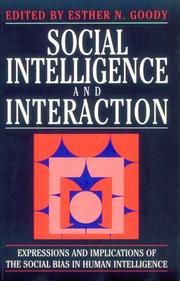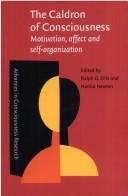| Listing 1 - 4 of 4 |
Sort by
|

ISBN: 0521453291 0521459494 051162171X Year: 1995 Publisher: Cambridge Cambridge University Press
Abstract | Keywords | Export | Availability | Bookmark
 Loading...
Loading...Choose an application
- Reference Manager
- EndNote
- RefWorks (Direct export to RefWorks)
There is a growing view that intelligence evolved as a product of social interdependence. The unique development of human intelligence was probably linked to the use of spoken language, but language itself evolved in the context of social interaction, and in its development it has shaped - and been shaped by - social institutions. Taking as their starting-point the social production of intelligence and of language, scholars across a range of disciplines are beginning to rethink fundamental questions about human evolution, language and social institutions. This volume brings together anthropologists, linguists, primatologists and psychologists, all working on this new frontier of research.
Cognitive psychology --- Sociolinguistics --- Intellect --- Social intelligence --- Intelligence --- Intelligence sociale --- Sociolinguistique --- Social aspects --- Aspect social --- Social intelligence. --- Sociolinguistics. --- Social aspects. --- #SBIB:309H518 --- Verbale communicatie: sociologie, antropologie, sociolinguistiek --- Language and languages --- Language and society --- Society and language --- Sociology of language --- Language and culture --- Linguistics --- Sociology --- Integrational linguistics (Oxford school) --- Intelligence, Social --- Social psychology --- Sociological aspects --- Social Sciences --- Anthropology --- sociolinguistique --- aspect social
Book
ISBN: 0765622629 1315703858 1317469100 1780342063 9786612119668 1282119664 0765624508 9781315703855 9781317469094 1317469097 9781317469087 1317469089 9780765622624 9781317469100 9781282119666 9781780342061 6612119667 9780765624505 Year: 2008 Publisher: Armonk, N.Y. Sharpe
Abstract | Keywords | Export | Availability | Bookmark
 Loading...
Loading...Choose an application
- Reference Manager
- EndNote
- RefWorks (Direct export to RefWorks)
With contributions from eminent scholars worldwide, this handbook is a state-of-the-science summary of the body of knowledge about cultural intelligence--an individual's ability to function effectively in situations characterized by cultural diversity--and its relevance for managing diversity both within and across cultures.
Cultural awareness. --- Diversity in the workplace. --- Social intelligence. --- Diversity in the workplace --- Cultural awareness --- Social intelligence --- Commerce --- Business & Economics --- Marketing & Sales --- Intelligence, Social --- Culture awareness --- Cultural diversity in the workplace --- Cultural diversity in workforce --- Diversity in the workforce --- Diversity in the work place --- Multicultural diversity in the workplace --- Multicultural workforce --- Workforce diversity --- Intellect --- Social psychology --- Awareness --- Cultural intelligence --- Ethnic attitudes --- Multiculturalism --- Personnel management --- Sociology of culture --- Labour market

ISSN: 1381589X ISBN: 9027251363 1556191960 9781556191961 1282254901 0585461201 9786612254901 902729996X 9789027251367 9780585461205 9789027299963 9781282254909 6612254904 Year: 2000 Volume: 16 Publisher: Amsterdam: Benjamins,
Abstract | Keywords | Export | Availability | Bookmark
 Loading...
Loading...Choose an application
- Reference Manager
- EndNote
- RefWorks (Direct export to RefWorks)
From a neuropsychological perspective, awareness of emotions is a complex function involving several components (perceptual decoding and conceptualization, memory and attention, and psychophysiological responses). Pathological conditions of the nervous system as well as certain experimental procedures in healthy persons may induce dissociations of these components. It is suggested that perceptual awareness of an emotional stimulus requires a correct stimulus identification as well as input monitoring. Awareness of experiential qualities is a more global function involving integration of interoceptive information, formation of emotional schemas or concepts, and recall of episodic memory of past emotions. Perceptual awareness of internal or external stimulus events can be defined and measured by means of psychophysical methods. Experiental qualities, however, are difficult to assess in a reductionist/physicalist framework.
Cognitive psychology --- Philosophical anthropology --- Consciousness --- Emotions --- Motivation (Psychology) --- Self-organizing systems --- Conscience --- Motivation (Psychologie) --- Systèmes auto-organisés --- Emotional Intelligence --- Behavior and Behavior Mechanisms --- Psychophysiology --- Personality Development --- Cognition --- Psychoanalytic Theory --- Mental Processes --- Intelligence --- Psychological Theory --- Personality --- Ego --- Motivation --- Social Sciences --- Psychology --- Feelings --- Human emotions --- Passions --- Affect (Psychology) --- Affective neuroscience --- Apathy --- Pathognomy --- Disincentives --- Expectations --- Incentives --- Disincentive --- Expectation --- Incentive --- Motivations --- Drive --- Self --- Egos --- Apperception --- Mind and body --- Perception --- Philosophy --- Spirit --- Personalities --- Human Characteristics --- Psychologic Theory --- Psychological Theories --- Theories, Psychological --- Theory, Psychological --- Social Cognitive Theory --- Cognitive Theories, Social --- Cognitive Theory, Social --- Psychologic Theories --- Social Cognitive Theories --- Theories, Psychologic --- Theories, Social Cognitive --- Theory, Psychologic --- Theory, Social Cognitive --- Human Information Processing --- Information Processing, Human --- Psychoanalytical Theory --- Theory, Psychoanalytic --- Oral Character --- Character, Oral --- Characters, Oral --- Oral Characters --- Psychoanalytic Theories --- Psychoanalytical Theories --- Theories, Psychoanalytic --- Theories, Psychoanalytical --- Theory, Psychoanalytical --- Cognitive Function --- Cognitions --- Cognitive Functions --- Function, Cognitive --- Functions, Cognitive --- Development, Personality --- Child Development --- Growth --- Mind-Body Relationship (Physiology) --- Physiologic Psychology --- Physiological Psychology --- Psychology, Physiologic --- Mind-Body Relations (Physiology) --- Psychology, Physiological --- Mind Body Relations (Physiology) --- Mind Body Relationship (Physiology) --- Mind-Body Relation (Physiology) --- Mind-Body Relationships (Physiology) --- Physiologic Psychologies --- Psychologies, Physiologic --- Relation, Mind-Body (Physiology) --- Relations, Mind-Body (Physiology) --- Relationship, Mind-Body (Physiology) --- Relationships, Mind-Body (Physiology) --- Psychosomatic Medicine --- Mind-Body Relations, Metaphysical --- Behavior And Behavior Mechanism --- Social Intelligence --- Emotional Intelligences --- Intelligence, Emotional --- Intelligence, Social --- Intelligences, Emotional --- Intelligences, Social --- Social Intelligences --- Interpersonal Relations --- Learning systems (Automatic control) --- Self-optimizing systems --- Cybernetics --- Intellect --- Learning ability --- Synergetics --- Action, Psychology of --- Drive (Psychology) --- Psychology of action --- Consciousness. --- Emotions. --- Self-organizing systems.
Book
ISBN: 9780691245133 9780691245089 0691245134 Year: 2023 Publisher: Princeton, N.J. Princeton University Press
Abstract | Keywords | Export | Availability | Bookmark
 Loading...
Loading...Choose an application
- Reference Manager
- EndNote
- RefWorks (Direct export to RefWorks)
"How the medieval church drove state formation in EuropeSacred Foundations argues that the medieval church was a fundamental force in European state formation. Existing accounts focus on early modern warfare or contracts between the rulers and the ruled. In contrast, this major study shows that the Catholic Church both competed with medieval monarchs and provided critical templates for governing institutions, the rule of law, and parliaments.The Catholic Church was the most powerful, wealthiest, and best-organized political actor in the Middle Ages. Starting in the eleventh century, the papacy fought for the autonomy of the church, challenging European rulers and then claiming authority over people, territory, and monarchs alike. Anna Grzymała-Busse demonstrates how the church shaped distinct aspects of the European state. Conflicts with the papacy fragmented territorial authority in Europe for centuries to come, propagating urban autonomy and ideas of sovereignty. Thanks to its organizational advantages and human capital, the church also developed the institutional precedents adopted by rulers across Europe-from chanceries and taxation to courts and councils. Church innovations made possible both the rule of law and parliamentary representation.Bringing to light a wealth of historical evidence about papal conflict, excommunications, and ecclesiastical institutions, Sacred Foundations reveals how the challenge and example of powerful religious authorities gave rise to secular state institutions and galvanized state capacity"-- "Sacred Foundations argues that the medieval church was a fundamental force in European state formation. Existing accounts focus on early modern warfare or contracts between the rulers and the ruled. In contrast, this major study shows that the Catholic Church both competed with medieval monarchs and provided critical templates for governing institutions, the rule of law, and parliaments. The Catholic Church was the most powerful, wealthiest, and best-organized political actor in the Middle Ages. Starting in the eleventh century, the papacy fought for the autonomy of the church, challenging European rulers and then claiming authority over people, territory, and monarchs alike. Anna Grzymała-Busse demonstrates how the church shaped distinct aspects of the European state. Conflicts with the papacy fragmented territorial authority in Europe for centuries to come, propagating urban autonomy and ideas of sovereignty. Thanks to its organizational advantages and human capital, the church also developed the institutional precedents adopted by rulers across Europe-from chanceries and taxation to courts and councils. Church innovations made possible both the rule of law and parliamentary representation. Bringing to light a wealth of historical evidence about papal conflict, excommunications, and ecclesiastical institutions, Sacred Foundations reveals how the challenge and example of powerful religious authorities gave rise to secular state institutions and galvanized state capacity"--
Church and state --- Christianity --- History. --- Influence. --- Europe --- Council of Europe countries --- Eastern Hemisphere --- Eurasia --- Church history --- Politics and government --- History --- 14th century. --- Adversarial system. --- Arbitration award. --- Archbishop of Canterbury. --- Archdeacon. --- Audit. --- Avignon. --- Baron. --- Benefice. --- Canon law (Catholic Church). --- Capitalism. --- Catholic Church in England and Wales. --- Cistercians. --- Clergy. --- Commercial Revolution. --- Common Pool. --- Conciliarism. --- Consent. --- Control variable. --- Criminal law. --- De facto. --- Debtor. --- Doctrine. --- Donation of Constantine. --- Dummy variable (statistics). --- Early modern period. --- Enthusiasm. --- Eternal life (Christianity). --- Exchequer. --- Excommunication. --- Exemption (church). --- Expenditure. --- Expense. --- Fisc. --- Forms of government. --- Friar. --- Fuero. --- Holy Roman Empire. --- Human capital. --- Hussite Wars. --- Imperial election. --- Institution. --- Interdependence. --- Investiture Controversy. --- Jean Gerson. --- Joint attention. --- Jurisdiction. --- Jurist. --- Justice of the peace. --- Justification (theology). --- Language code. --- Language. --- Languedoc. --- Lawyer. --- Lollardy. --- Lump sum. --- Magnanimity. --- Merciless Parliament. --- Moneyer. --- Monogamy. --- Null hypothesis. --- Pacta sunt servanda. --- Panel data. --- Pawnbroker. --- Pope Gregory IX. --- Pope Leo X. --- Pope Paul III. --- Pope Pius X. --- Pope. --- Popularity. --- Precedent. --- Prerogative. --- Property law. --- Prosecutor. --- Public morality. --- Reprisal. --- Residence. --- Right of passage. --- Roman Law. --- Ruler. --- Scientist. --- Separation of church and state. --- Skill. --- Social environment. --- Social intelligence. --- Sources of law. --- Sovereignty. --- Spoken language. --- State formation. --- Statutes of Mortmain. --- Superiority (short story). --- Supranational union. --- Symbolic communication. --- Tax. --- Throne. --- Tories (British political party). --- Whigs (British political party). --- William of Ockham. --- World government. --- Writ of prohibition. --- Canon law --- Clergy --- Clergy members --- Clergymen --- Diocesan clergy --- Ecclesiastics --- Indigenous clergy --- Major orders --- Members of the clergy --- Ministers (Clergy) --- Ministers of the gospel --- Native clergy --- Ordained clergy --- Ordained ministers --- Orders, Major --- Pastors --- Rectors --- Secular clergy --- Religious leaders --- Public law (Canon law) --- Law --- Ecclesiastical law --- Rescripts, Papal --- Catholic Church --- Christian church history --- History of Europe --- anno 500-1499 --- anno 1500-1799 --- Dogma.
| Listing 1 - 4 of 4 |
Sort by
|

 Search
Search Feedback
Feedback About UniCat
About UniCat  Help
Help News
News